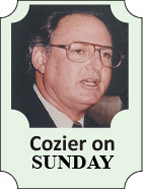After yet another year of habitual turbulence, West Indies cricket starts 2012 with an issue that is potentially more damaging than any of the several others responsible for the current depressed state of the game in the region.
Without judicious handling, there have already been portents, as unimaginable as they are, that it could lead to the separation from West Indies cricket of Guyana, one of the pillars of its strength from its very beginnings.

The background is complicated, involving internal wrangling within the GCB that led to a boycott of elections last July by some of its constituent members.
Maintaining that the board was not properly established as a result, the matter was carried to court a month later by a Berbice representative.
In his ruling, Chief Justice Ian Chang noted that the existence of a ministry responsible for sport in general “indicates that the State has assumed responsibility for the welfare, promotion and proper administration of sports in Guyana and that, since in the present state of affairs, while a legislative structure for the administration of cricket is desirable, there may be the immediate need for the minister responsible for sport to impose his executive will in the national interest until such time as parliament can provide a more permanent welfare structure.”
It was enough for sports minister Dr. Frank Anthony to make the initial move to set up the IMC.
Where that left the WICB was not clear. The ICC declaration was seen as directed primarily at Pakistan, where the president is board patron, and Bangladesh and Sri Lanka, where the sports ministries are directly involved in the running of things, down to approving team selection. (The Sri Lankan ministry last week vetoed seam bowler Nuwan Kulasekara’s choice as a replacement player on the current tour of South Africa, bringing in uncapped Kanishka Alvitigala instead).
It did not appear to take into account the peculiar circumstances of the West Indies where there is no single national government, as with its other full members, but several independent nations, each with its own constitution, administration and popularity-seeking politicians.
In addition to the 10 sports ministries in the WICB’s member territories, there is also Caricom’s sub-committee on cricket that has taken an increasing interest in the WICB’s management.
The ICC has presumably left dealing with such local complexities, of which the present impasse in Guyana is a prime example, to the WICB. If its response to the IMC’s original formation is anything to go by, it is likely to take a hard line in support of the GCB, one of its founding members.
Well founded reports at the time were that it would move the regional 50-overs competition and the closing stages of the Pakistan women’s tour away from Guyana, where they were originally scheduled, debar Guyana’s participation from regional tournaments and even Guyana players from selection to West Indies teams.
These would have been harsh, self-defeating measures that would have wrecked not only Guyana but West Indies cricket. The present reality requires careful consideration of all of the many problems involved and constructive conclusions.
The initial standoff appeared to be settled after meetings between WICB president Julian Hunte and former captain, and WICB member Clive Lloyd and then Guyana president Bharat Jagdeo and Dr. Anthony. The GCB remained in place – but only after the November 28 general elections when Dr. Anthony could turn his attention to assembling personnel for the IMC.
They have now been appointed.
Given his position as an ex-officio director of the WICB and head of the ICC’s cricket community, Lloyd has been surprisingly, if most significantly, named as chairman of the IMC of 15 who include eight from the previously recognised boards, two from Berbice, two Essequibo, two from the previously recognised GCB and one each from the two blocs of the Demerara Cricket Board.
Lloyd is arguably Guyana’s most respected cricketer. He has remained a prominent figure in the game since his retirement.
He would hardly have accepted the invitation to head the IMC without due thought. Nor is it conceivable that he would have done so without informing the WICB and the ICC of his intentions.
His role, he has said, is to try to return the organization of Guyana’s cricket to normalcy.
His committee has been charged, among other things, with drafting a new constitution for the GCB that would go to all county boards and other stakeholders “for their deliberations and adoption”, to bring together into one board the factions of the Demerara Cricket Board (one source of the GCB’s problems) and to review on all GCB’s financial transactions through an independent auditor.
It is a daunting task for someone resident for several years outside of Guyana but it is surely worth a try. And he and his committee need to be encouraged, not blocked, in their endeavours.
There is simply too much at stake should they fail.





